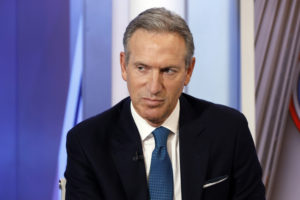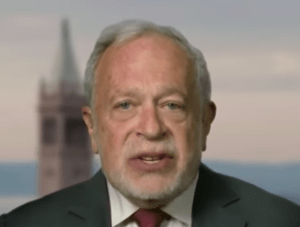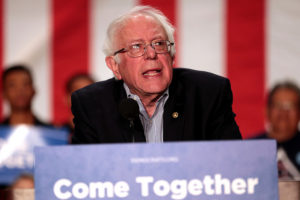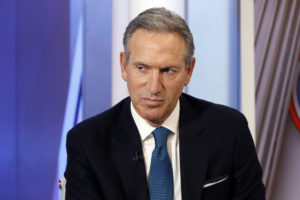Truthdigger of the Week: Jaime Prater, Starbucks Barista Who Got Workers a Raise
By pulling a little more compensation out of his employer for himself and his colleagues via a petition, Prater showed that deliberate, collective action still can help working people.

Elise Amendola / AP
Every week the Truthdig editorial staff selects a Truthdigger of the Week, a group or person worthy of recognition for speaking truth to power, breaking the story or blowing the whistle. It is not a lifetime achievement award. Rather, we’re looking for newsmakers whose actions in a given week are worth celebrating.
Want a raise?
Jaime Prater did. A Starbucks barista for nine years, the 40-year-old resident of Montclair, Calif., was paid $10 an hour and given between 22 and 25 hours of work a week — at least 11 hours short of what he needs just to make ends meet. And compared to the standards of living among the professional class, what modest ends they surely are.
This week, Prater managed to pull modest raises for himself and his colleagues out of his employer, Starbucks CEO Howard Schultz.
“[E]ffective October 3,” Schultz wrote last Monday in a letter to employees that begins with a reference to the week of racial shootings across the country, “all partners and store managers in U.S. company-operated stores will receive an increase in base pay of 5% or greater.” This raise and an increase in the stock holdings of employees who have been with the company for more than two years “will result in compensation increases between 5% and 15%,” Schultz added.
Schultz also promised changes to the company’s benefits program that could save employees “as much as $800 annually” and “perhaps as much as $2,600 annually” for families, and gave his “personal commitment” to “work with every partner [read: employee] to ensure you have the hours you need.”
Schultz’s letter came after Prater launched a petition in June titled “Starbucks, Lack of Labor Is Killing Morale,” demanding that the company halt purported practices of giving employees too few hours and paying them too little. By mid-July, more than 13,000 people, many of them self-identified Starbucks workers, had signed the petition.
Prater and many signers say they had seen cutbacks in their hours in spring after Starbucks stock suffered a slowdown in growth. Several of the signers said store managers were under pressure to meet demands determined by Starbucks software. Some staff also said a new mobile ordering system had cut into their wages. Roughly 150,000 people staff Starbucks’ 7,600 U.S. cafes.
Schultz did not directly refer to Prater’s petition in his letter. And according to Prater, the response was inadequate.
“Howard Schultz did not acknowledge or validate the labor crisis in the stores,” Prater told Reuters. “Until that is addressed, or simply acknowledged, my job isn’t finished.”
In the petition, Prater struck a tone of solidarity with customers and Starbucks workers, according to its stated goals.
“Morale is at the lowest I’ve seen it in my nearly 9 years of service with Starbucks,” Prater wrote. “Customers feel this the most, of anyone.
“If this is going to change, the corporate side of the company is going to have to understand that under employing people, while understaffing their stores is a recipe for disaster,” he wrote. “We want Starbucks to ease up, give us room to breathe, to have the proper kind of staff to ultimately, give our amazing and wonderful customers the service they deserve. Right now, that’s not happening. Customer Service is declining, the third place experience is disappearing.
“The labor situation has gone from tight to infuriating,” Prater continued. “Labor has been cut so much in corporate stores, that one call-off (an employee calling in sick) impacts the entire day, as managers are directed to cut shifts to save on labor costs. Baristas trying to work more than 25 hours a week (myself included) find that a near impossible task. You end up taking it personally, when corporate directs your stores to understaff, and under schedule. You wonder if they realize how difficult it is to pay your bills when you work 25 hours a week?
“Right now, the labor allowed to stores is so dire that it’s killing morale, companywide. Let it be stated that this job isn’t a hard one. It’s demanding, but it’s easy work, if trained properly. Customers want their coffee and they want it in a timely fashion. As labor continues to be cut, it creates an atmosphere where baristas are worn to the bone without being able to take a breath. Cleanliness suffers, speed of service suffers, partners suffer.”
In late June, Reuters reported that Prater spoke directly to Schultz and others among the company’s top brass. Starbucks declined to provide details.
“Power concedes nothing without a demand,” the abolitionist Frederick Douglass wrote. Schultz deserves some credit for acceding to at least some of the demands of those whose labor enables his fortune and status. The workers may not get all they want from their bosses, but Prater and the signers of his petition have in this expectation-defying period of social struggle added another example of deliberate, collective action improving lives. Jaime Prater is our Truthdigger of the Week.
Your support matters…Independent journalism is under threat and overshadowed by heavily funded mainstream media.
You can help level the playing field. Become a member.
Your tax-deductible contribution keeps us digging beneath the headlines to give you thought-provoking, investigative reporting and analysis that unearths what's really happening- without compromise.
Give today to support our courageous, independent journalists.






You need to be a supporter to comment.
There are currently no responses to this article.
Be the first to respond.